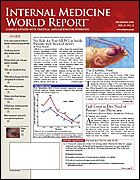Experts Question Association of Appendectomy to Crohn's Disease
LAS VEGAS—Patients who undergo appendectomy are nearly 7 times more likely than controls to be diagnosed with Crohn’s disease within 1 year of the surgery, according to the results of a recent literature review presented at the American College of Gastroenterology meeting. The review also found that after the first year, the risk of Crohn’s disease drops to <2 times that of individuals who have not had an appendectomy.
This spike and subsequent drop in risk for postappendectomy Crohn’s diagnosis, some experts suggest, may be partly an artifact of diagnostic bias, not a true reflection of postoperative biological disease. “Patients with Crohn’s disease can have symptoms similar to patients experiencing appendicitis,” explained lead investigator Gilaad Kaplan, MD, of Harvard University Medical School. “These patients might undergo a negative appendectomy and then subsequently be diagnosed with Crohn’s disease. In this example, the appendectomy precedes the diagnosis of Crohn’s disease but does not cause it.”
Gastroenterology
Surgery
Previous findings regarding the association between appendectomy and Crohn’s disease have been mixed. At least 6 studies found that appendectomy was a risk factor for subsequent Crohn’s disease, but 2 others concluded that it decreased risk (eg, . 2003; 124: 40-46). Adding to this confusing mix, 6 studies found no association between appendectomy and Crohn’s disease (eg, . 2001; 130:36-43).
This systematic review of 12 case-control studies and 2 cohort studies looked at the number of Crohn’s disease diagnoses in appendectomy patients versus controls. Relative risk of Crohn’s disease was calculated in the first postoperative year, between the second and the fifth years, and after the fifth year.
Overall, appendectomy patients were 1.33 times more likely to be diagnosed with Crohn’s disease than controls. When restricting the analysis to patients diagnosed with the disease during the first postoperative year, appendectomy patients were 6.69 times more likely to develop Crohn’s disease.
When diagnoses made in the first postoperative year were excluded, however, the relative risk dropped to 1.3 (still statistically significant). Appendectomy patients were also 1.99 times more likely than controls to be diagnosed with Crohn’s disease between the second and fifth postoperative years, but the difference in risk between the 2 groups disappeared after 5 years.
Inflammatory bowel disease expert Edward Loftus, MD, of the Mayo Clinic College of Medicine, Rochester, said that this study shows that much of the correlation between appendectomy and Crohn’s disease is likely spurious. However, he pointed to the heightened risk after the first postoperative year as evidence of a biological component in the association.
IMWR
“The protective effect appendectomy has in ulcerative colitis and the persistent association between Crohn’s and appendectomy beyond 1 year that this study shows makes one think that perhaps the appendix plays more of a role in the regulation of the gut’s immune system than we realize,” Dr Loftus told .
